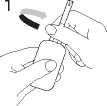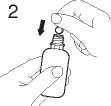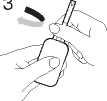Entocort Enema
SPO-003-D 210x590 01-0

Read all of this leaflet carefully before you start using this
medicine because it contains important information for you.
• Keep this leaflet. You may need to read it again.
• I f you have any further questions, ask your doctor or pharmacist.
• This medicine has been prescribed for you only. Do not pass it on to others. It may harm them, even if their signs of illness are the same as yours.
• I f you get any side effects, talk to your doctor or pharmacist. This includes any possible side effects not listed in this leaflet. See section 4.
What is in this leaflet
1. What Entocort Enema is and what it is used for
2. What you need to know before you use Entocort Enema
3. How to use Entocort Enema
4. Possible side effects
5. How to store Entocort Enema
6. Contents of the pack and other information
1. What Entocort Enema is and what it is used for
Entocort Enema contains a medicine called budesonide. This belongs to a group of medicines called ‘corticosteroids’. These are used to reduce inflammation.
• An enema is a liquid that is inserted into the back passage (rectum).
• Entocort Enema is used to treat inflammation and ulcers in the large intestine (colon) and rectum. This is known as ulcerative colitis.
2. What you need to know before you use Entocort Enema
5. Squeeze the bottle, this will push most of the liquid into your back passage. However, you will not be able to empty the whole bottle. It has been designed to keep some liquid after being used.
6. Then remove the nozzle from your back passage.
7. If you used a plastic bag, remove it from 7
your hand by pulling it forward over the bottle. This will leave the bottle inside the bag, ready to be disposed of.
8. Now, roll over onto your stomach. Stay like this for 5 minutes to stop any liquid coming out of your back passage.
9. Then, find a comfortable position to sleep in that helps you to keep the liquid in your back passage for as long as possible.
Entocort Enema is a ‘retention enema’. This means that the liquid is meant to be held in the back passage for as long as possible. The longer it is kept there the more time it has to work and the better the results should be.
If you use more Entocort Enema than you should
If you use more enemas than prescribed by your doctor, talk to a doctor or pharmacist straight away.
If you forget to use Entocort Enema
• I f you forget a dose of Entocort Enema, use it as soon as you remember. However, if it is nearly time for the next dose, skip the missed dose.
• Do not use a double dose (two doses at the same time) to make up for a forgotten dose.
If you stop using Entocort Enema
Do not stop using Entocort Enema without talking to your doctor first. If you stop using your enema suddenly it may make you ill.


Do not use Entocort Enema:
If you are allergic to budesonide or any of the other ingredients of this medicine (listed in section 6).
Warnings and precautions
Talk to your doctor or pharmacist before using Entocort Enema:
• I f you have recently had a bowel infection.
• I f you have ever had liver problems.
• I f you or a member of your family has ever had mental health problems.
Other medicines and Entocort Enema
Tell your doctor or pharmacist if you are taking, have recently taken or might take any other medicines. This includes medicines that you buy without a prescription and herbal medicines. This is because Entocort Enema can affect the way some medicines work and some medicines can have an effect on Entocort Enema.
In particular, tell your doctor or pharmacist if you are taking any of the following medicines:
• Steroid medicines, such as prednisolone or dexamethasone.
• Ketoconazole or itraconazole, used to treat infections caused by a fungus.
• Medicines that contain oestrogen, such as hormone replacement therapy (HRT) and some oral contraceptives.
• HIV protease inhibitors (such as ritonavir and nelfinavir).
• Carbamazepine (used to treat epilepsy and fits).
Pregnancy, breast-feeding and fertility
If you are pregnant or breast-feeding, think you may be pregnant or are planning to have a baby, ask your doctor or pharmacist for advice before taking this medicine.
Driving and using machines
Entocort Enema is not likely to affect you being able to drive or use any tools or machines.
Entocort Enema contains propyl parahydroxybenzoate (E216), methyl parahydroxybenzoate (E218) and lactose
Entocort Enema contains propyl parahydroxybenzoate (E216) and methyl parahydroxybenzoate (E218), these may cause allergic reactions (possibly delayed).
Entocort Enema also contains lactose, a type of sugar, which some people may be intolerant to. If you have been told by your doctor that you have an intolerance to some sugars, please talk to your doctor before using this medicine.
If you have any further questions on the use of this medicine, ask your doctor or pharmacist.
4. Possible side effects
3. How to use Entocort Enema
Always use this medicine exactly as your doctor has told you. Check with your doctor or pharmacist if you are not sure.
Entocort Enema should only be used in your back passage (rectum), as directed by your doctor.
Use in children
Entocort Enema is not recommended for use by children.
When to use Entocort Enema and how long to use it for
• I t is important to use each enema at the right time.
• Usually this will be once a day, just before bedtime.
• Normally, your treatment will last for 4 weeks. However, your doctor may decide that you need to use Entocort Enema for longer.
Parts of the bottle
To prepare your enema for use, you need to be familiar with the following parts of the plastic bottle:
Preparing Entocort Enema for use
To prepare one enema, dissolve one tablet in one bottle of liquid.
To do this, follow the instructions below:
1. Take one of the plastic bottles containing a liquid. Unscrew the complete nozzle section and protective cap in one piece.
Protective Cap
Nozzle
Tablet
Bottle -

Like all medicines, this medicine can cause side effects, although not everybody gets them.
If you have an allergic reaction, see a doctor straight away. The signs may include raised lumps on your skin (weals), or swelling of your face, lips, mouth, tongue or throat. This may make it difficult to breathe.
Other possible side effects:
Common: may affect up to 1 in 10 people
• Upset stomach or gut such as stomach pains, wind, diarrhoea, heartburn and feeling sick.
• Skin reactions such as lumpy rash and skin rash.
Uncommon: may affect up to 1 in 100 people
• Feeling agitated.
• Difficulty sleeping.
Rare: may affect up to 1 in 1,000 people
• An effect on the adrenal gland (a small gland near the kidney).
Very rare: may affect up to 1 in 10,000 people
• A severe allergic reaction (called anaphylaxis) which may cause difficulty in breathing or shock.
Other side effects may include:
• Glaucoma (increased pressure in the eye).
Medicines like Entocort Enema (corticosteroids) can affect the normal production of steroid hormones in your body. The effects include:
• Changes in bone mineral density (thinning of the bones).
• Glaucoma (increased pressure in the eye).
• A slowing of the rate of growth of children and adolescents.
• An effect on the adrenal gland (a small gland near the kidney).
Mental health problems can happen while taking steroids like Entocort Enema. Talk to a doctor if you (or someone taking this medicine), show any signs of mental health problems.
This is particularly important if you are depressed, or might be thinking about suicide. Very rarely mental health problems have happened when high doses have been taken for a long time.
Do not be concerned by this list of possible side effects. You may not get any of them. If any of the side effects get serious, or if you notice any side effects not listed in this leaflet, please tell your doctor or pharmacist.
Reporting of side effects
If you get any side effects, talk to your doctor, pharmacist or nurse. This includes any possible side effects not listed in this leaflet. You can also report side effects directly via the Yellow Card Scheme. Website: www.mhra.gov.uk/yellowcard. By reporting side effects you can help provide more information on the safety of this medicine.
5. How to store Entocort Enema
Keep this medicine out of the sight and reach of children.
Do not store this medicine above 30°C.
Do not use this medicine after the expiry date which is stated on the bottle or foil after EXP. The expiry date relates to the last day of that month.
Do not throw away any medicines via wastewater or household waste. Ask your pharmacist how to throw away medicines you no longer use. These measures will help protect the environment.
6. Contents of the pack and other information

2. Take one of the tablets from its foil strip. Then drop it into the bottle.

3. Put the nozzle and protective cap back onto the bottle. Then screw them up until they are tight.

4
4. Shake the bottle well for at least 15 seconds, or until you cannot see the tablet in the liquid any more.

5. The enema is now ready. Use it straight away.
• You will find it more comfortable to use Entocort Enema if you empty your bowels and bladder before using it.
• Entocort Enema can stain your bedclothes. It is best to protect your bedclothes with a plastic sheet in case any liquid is spilled.
Inserting the enema into your back passage
To insert the enema into your back passage, follow the
instructions below:
1. Shake the bottle again. Then only take off the protective cap. This will reveal the nozzle.
2. Undress from the waist down, then lie down on your side. Choose whichever side is most comfortable.
Try to lie down so that your bottom is slightly higher than the rest of your body. For example, you can raise the bottom of the bed onto blocks or place one or two pillows under your bottom. This will help to keep the liquid in your back passage.
3. If you wish, hold the bottle 3 using one of the plastic bags.
4. Gently ease the nozzle into your back passage as far as is comfortable.

What Entocort Enema contains
The active substance is budesonide. Each bottle provides a dose of approximately 2 mg of budesonide at a concentration of 0.02 mg of budesonide per ml of solution.
The other ingredients are lactose anhydrous, polyvidone, riboflavine sodium phosphate, lactose monohydrate, magnesium stearate, colloidal anhydrous silica, sodium chloride, methyl parahydroxybenzoate (E218), propyl parahydroxybenzoate (E216) and water purified.
What Entocort Enema looks like and contents of the pack
Entocort Enema, once prepared, is a whitish yellow liquid.
Entocort Enema comes in a box containing the following:
• 7 tablets wrapped in foil, inside a small box.
• 7 plastic bottles containing solution.
• 7 plastic bags to be used when giving the enema.
Marketing Authorisation Holder and Manufacturer
The Marketing Authorisation for Entocort Enema is held by AstraZeneca UK Ltd, 600 Capability Green, Luton, LU1 3LU, UK. Entocort Enema is manufactured by Takeda Pharma Sp. z o.o., ul. Ksi^stwa Lowickiego 12, 99-420 tyszkowice, Poland.
To listen to or request a copy of this leaflet in Braille, large print or audio please call, free of charge:
0800 198 5000 (UK only)
Please be ready to give the following information:
Product name Entocort Enema
Reference number 17901/0123
This is a service provided by the Royal National Institute of Blind People.
This leaflet was last revised in October 2014
© AstraZeneca 2014
Entocort is a trade mark of the AstraZeneca group of companies. GI 14 0030
AstraZeneca^'
